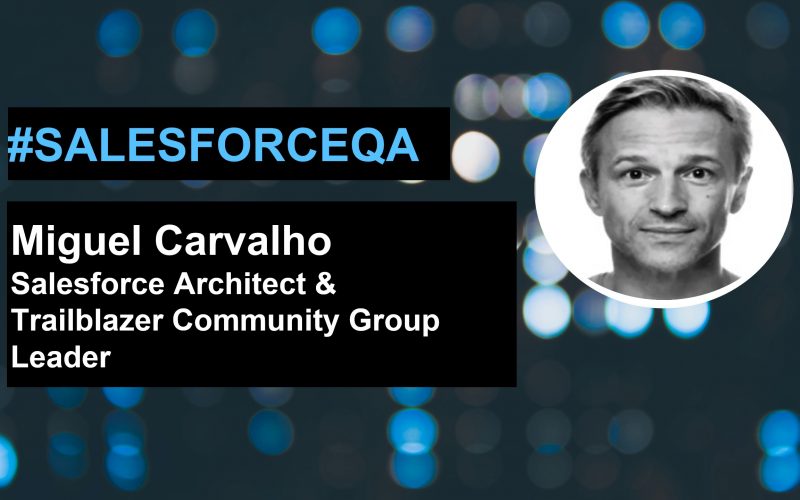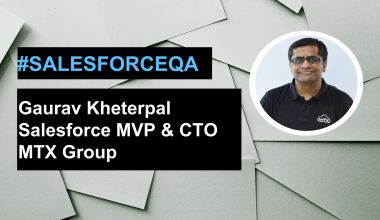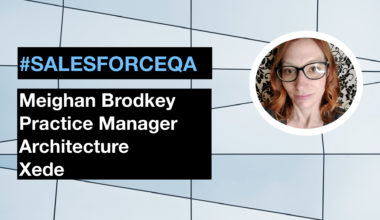In our most recent #SalesforceQA, we caught up with Miguel Carvalho, Salesforce Consultant & Architect at Agile Force and the Porto Trailblazer User Group Leader.
Miguel talks about the key traits needed to succeed as a Technical Architect and offers his top tips to others looking to engage with the virtual Salesforce community. Miguel also discusses whether certifications are essential for success in the ecosystem.
Salesforce Republic (SR): To start, could you tell us a bit about how you got into a career in the ecosystem?
Miguel Carvalho (MC): This is actually a funny story. I am Portuguese but was raised in the Netherlands, and around five years ago I came back to the Netherlands for a job; because it was a temporary thing, I left my family back in Portugal and came alone. With all the free time I had I started looking at different groups and things that I could get involved with and either by accident or coincidence I came across a Salesforce group. I had never used Salesforce before but thought it might be interesting. At the time it was one of the first ever Salesforce meetups in the Netherlands and it was great to meet so many people.
Initially I was attending these meetups just for fun but then a few months later I moved to a different company and changed roles. At this company I was an IT Manager and we used Salesforce from an end-user perspective. I was also extremely motivated by the people I had met at these community meetups, they encouraged me to really get involved and that’s how I started Salesforce Saturdays and getting to be a Community Group Leader.
SR: What do you think are the key traits needed to succeed as a Salesforce Technical Architect?
MC: This might seem obvious, but of course you need to have your hard skills. You need technical knowledge; you need to know how to design a technical solution that is high performing and secure.
Alongside technical skills and no less important are soft skills. As a Technical Architect you need to be able to communicate not only with the people in your team but the people outside as well. For me communication is super important, you can have all the technical ability you need but if you are unable to express yourself in a clear way you are going to run into issues in your projects.
I am a musician; when I used to go on stage I would enter into this persona of confidence, I was leading the stage and the audience. As a Technical Architect, you need to be very good at taking the lead, besides communication skills, you need to have leadership skills.
The ability to problem-solve is key. When you see a problem, you need to be very creative because sometimes the theory and what you come across in your projects are different.
Of course, this is all nice, but you need to also have experience. As a Technical Architect there is an expectation that you have all kinds of skills and have done many roles in your career. You might have been Project Manager, a Developer, and a Consultant. In my opinion you need to have experience with these different roles so that you understand the different needs of these roles when creating your solution. You definitely need to have been involved in the entire lifecycle and every phase of a Salesforce org project.
SR: Do you have any top tips for Salesforce professionals when they have to communicate technical content to non-technical people?
MC: This can be very difficult, but I think practice is essential to helping you build up your confidence to where you can comfortably carry out a conversation with someone outside of your team. As part of the Salesforce Saturdays I run, I give the opportunity for every member to present to the group. Which I think is important as it allows them to talk about the Salesforce platform, any problems or solutions they have come across, and actually build a rapport with people and develop these communication skills. Practice makes perfect, and the best way to practice is doing so in an environment where you feel safe and know the people. Salesforce Saturdays are great for that, it’s sort of like your second family.
SR: As the Porto User Group Leader, given that most in-person events cannot happen at the moment, how are you finding maintaining community connections virtually?
MC: In the beginning, I confess, it was a bit complicated because I think what makes these events worthwhile is being able to have that in-person conversation and connect with a person you have never met before. You don’t get this same interaction at virtual events. However, I think running these events online has been a great way to increase the reach of the meetups and get more people involved. People tend to be more available in these online events because you can join from anywhere and you don’t have to leave home. I also think that people have become less afraid of networking at meetups because they are mainly talking to a camera. For me, these online meetups have been a positive experience.
SR: What are your top tips to others looking to engage with the virtual Salesforce community?
MC: Now that events are being held virtually, I’ve noticed that the people attending our meetups are actually from outside our normal region. Typically, I expect people from Porto or in this case, the whole of Portugal by any means, but now we see people from everywhere signing up. As such, my advice is to be involved not only with your local community because now it’s actually not local anymore, and join other communities as well don’t limit yourself to a specific area. It’s a great way to meet new people and see how other Salesforce events are run in different countries.
I also think there is this assumption that an Admin should only go to an Admin User Group or a Developer should only go to Developer meetups, but I completely disagree. I think it’s interesting to go as a Developer, to an Admin User Group. It helps you to learn more about the platform.
SR: You are also a x25 certified Salesforce professional, in your opinion are certifications essential for success in the ecosystem?
MC: You don’t need to have 25, but I think having a Salesforce certification is important as it provides a level of credibility to your skill. It shows that you have taken the time to learn about the platform and that you are willing to learn more. However, it doesn’t mean that if you don’t have any hands-on experience, you have the necessary qualities to do a specific role. It’s a yes and no answer; yes, I think you should have at least one certification. But it’s all about you. It’s all about how you communicate, your real experiences and your capabilities.
My focus for getting certifications is to motivate others. Being so heavily involved with the community I wanted to show that certifications aren’t an impossible thing if you put in the work. That’s actually why I started all these certifications.
SR: When you approach a certification, do you have a particular process?
MC: I usually do a certification when I’m involved in a project that is using one of the clouds. Having that hands-on experience helps when learning for the certification and vice versa. What I like to do when I’m studying for a certification is go through all the resources available; study guides, Salesforce documentation, everything I can get and put it all into one single document. Then whenever I am travelling or have time to spare, I read through this document. I don’t have a fixed time to study I just do it whenever I have the time. For me this is the best way to learn the information.
SR: What advice would you give to others looking to achieve their certifications?
MC: It’s all about setting goals and having perseverance. Setting yourself goals makes you accountable for what you want to achieve. If it’s a yearly goal or a quarterly goal, it doesn’t matter. But you need to have your goals and then work towards them and not give up.
Everyone has their own way of goal setting, for me I set reminders in my calendar so I know when my goal is approaching and what work I need to do.
SR: Finally, what are you most excited about seeing from Salesforce in 2021 and beyond?
MC: Salesforce have been buying a lot of technology recently and I’m excited to see how this will evolve Salesforce and what it will become. It’s a continuous wheel, now that you’ve invented something; how are you going to reinvent it? We just have to wait and see.
Final Comments:
MC: My advice to any Salesforce professional is that if you want to get the most out of your career in the ecosystem you need to get involved with the community. It doesn’t matter how you get involved, or what role you take but it’s essential to be involved. Why not try answering community questions or attending a Salesforce Saturday?
If you’re a Salesforce professional and would like to join Miguel in our Q&A series, please get in touch with us today!


